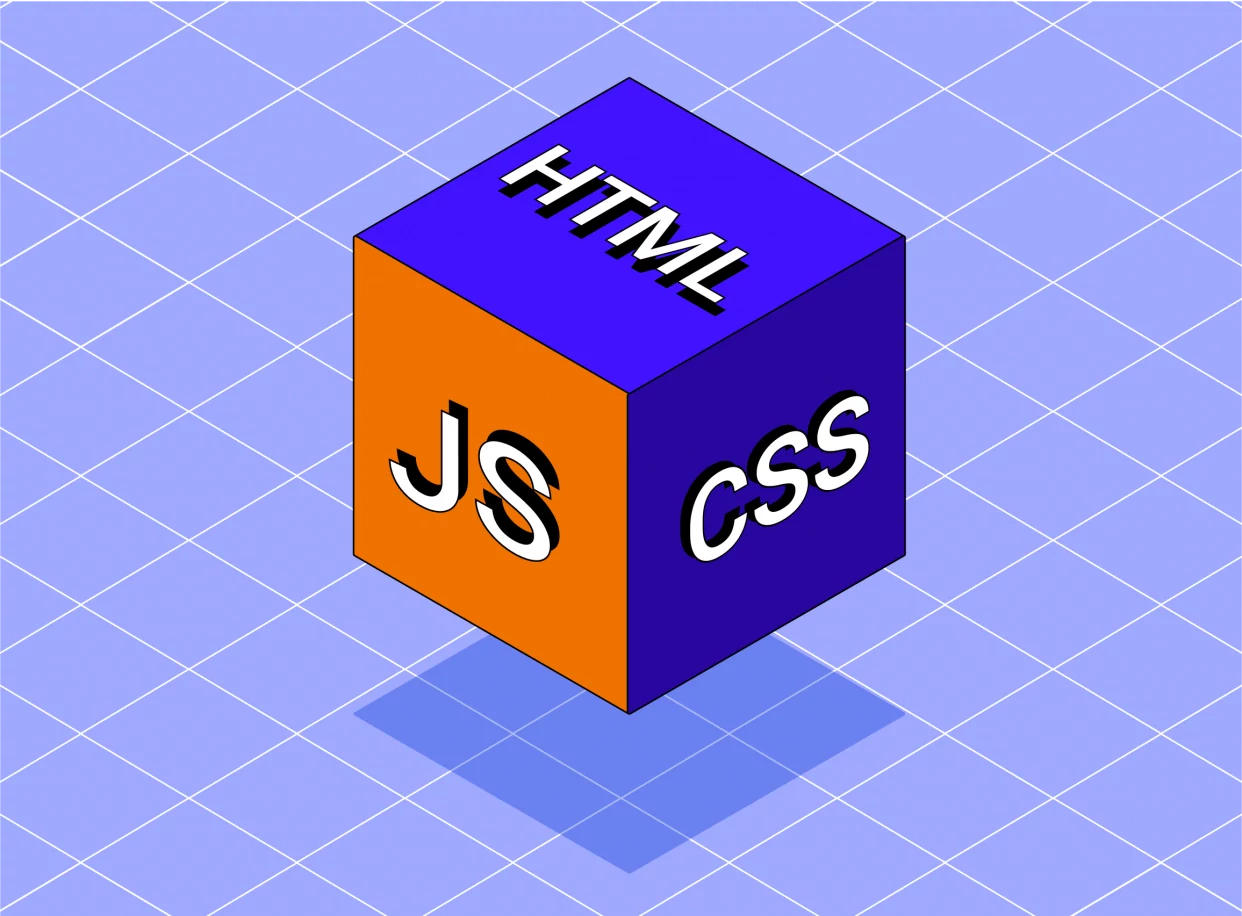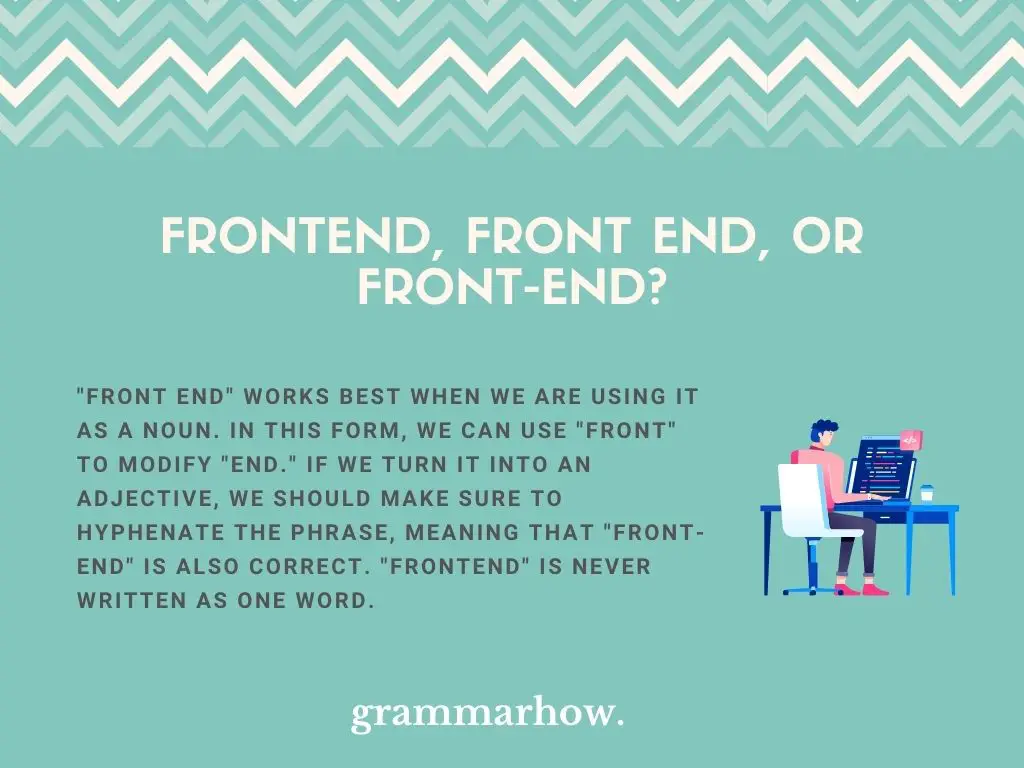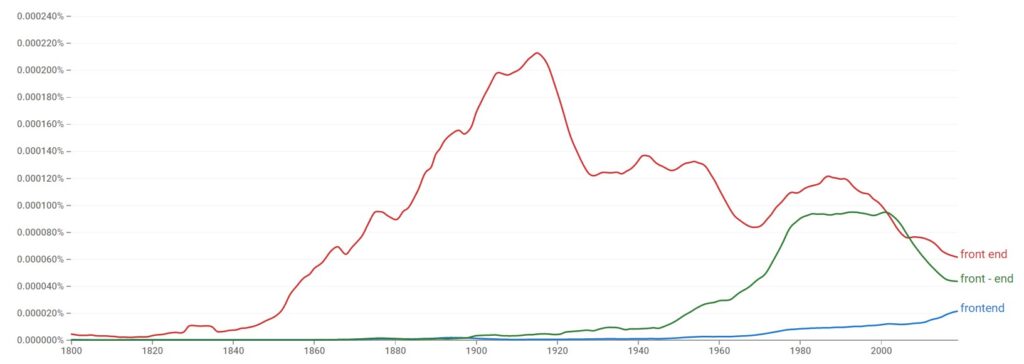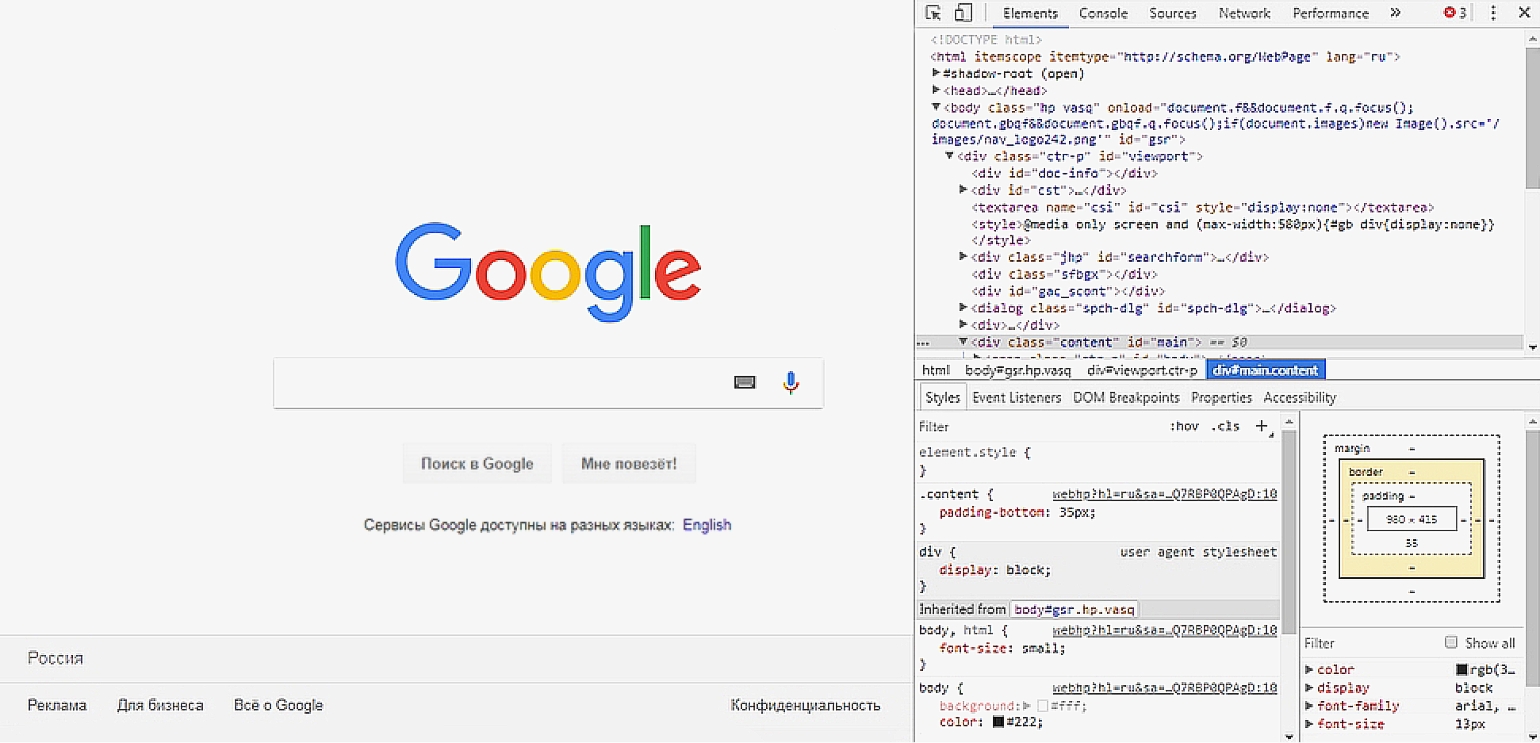Before talking about the “front end” of a system, it’s going to be useful to know how to spell it. We’ll teach you whether it’s one or two words and if the hyphenated form is something that you need to understand.
“Front end” works best when we are using it as a noun. In this form, we can use “front” to modify “end.” If we turn it into an adjective, we should make sure to hyphenate the phrase, meaning that “front-end” is also correct. “Frontend” is never written as one word.
According to Google Ngram Viewer, “front end” is more common, but there are still plenty of cases where “front-end” is correct as a hyphen form. This shows they are both likely to work in your writing.
The Cambridge Dictionary and The Oxford Dictionary both have entries alluding to “front end” as a noun. They both show that it should be written as two words in almost all cases.
However, they also both state that “front-end” is acceptable as an adjective. The examples they provide make it much clearer what this means.
Here are some examples to help you understand what it means too:
- Adjective: I’m a front-end developer.
- Noun: Let’s work through the front end first.
Is “Frontend” One Word?
“Frontend” is not correct when it’s grouped into one word. We must keep the hyphen present to show that there’s a clear difference between the words “front” and “end.” Sometimes, it’s okay to drop a hyphen like this, but this is not one of those cases.
Here are some examples of how you can make it work:
- Correct: Are you a front-end developer? Do you think you could help me figure this out?
- Incorrect: As someone who needs a frontend developer qualification before working here, I’ll still do my best to help you out.
- Correct: You’re not going to figure out the front end by just staring at it.
- Incorrect: Let’s not look into the frontend just yet. I think there’s more that we need to discuss first.
Is “Front end” Two Words?
“Front end” is correct as a noun. We can use the two words without connecting them to show that it’s correct as a standalone phrasal noun. “Front” is used to modify “end,” which shows the order of how a system should work (or how you can work on it).
Here are a couple of examples that should clue you in a bit more:
- You’re not going to be able to get the front end sorted in time, are you?
- I’d like to see what he can do on the front end. I’ve heard he’s got remarkable skills, but I’ll need to test them.
- You’ll be working with her on the front end. I expect you to finish the task in record time.
- Let’s just discuss how to use the front end first. We’ll figure out the rest later.
Is “Front-end” Hyphenated?
“Front-end” is hyphenated when we use it as an adjective. This form is used to modify another noun (i.e. “front-end developer”). The noun must always come straight after the adjective form when we hyphenate it in this way to aid the reader’s understanding.
AP Stylebook guidelines allow us to hyphenate more than one word when those words modify a common noun. Since “front” and “end” are both used to modify a specific noun, it makes sense that we would hyphenate them to demonstrate this.
Here are some examples that should help you understand what we mean about it:
- I’m going to need a few front-end developers to sort this out for me. Do you know any?
- We have a front-end developer coming in to help us out. I think it would be worth listening to him.
- You’re not the front-end web developer that we came to look for. Though, you’ll probably still do just fine.
- He’s working with the front-end system, so you’ll need to wait for a little while to see what he makes of it.
Is “End” Capitalized In The Word “Front-End”?
Finally, let’s quickly go over how to capitalize hyphenated forms. Some people struggle with this, so we want to make sure we figure it out right away.
“End” does not need to be capitalized in “front-end.” If we start a sentence with it, only “front” is capitalized as the hyphen treats the two words as one. However, in a title, you might find it more useful to write it as “Front-End” to fit in better.
You may also like: Backend, Back end, or Back-end? (Helpful Examples)
Martin holds a Master’s degree in Finance and International Business. He has six years of experience in professional communication with clients, executives, and colleagues. Furthermore, he has teaching experience from Aarhus University. Martin has been featured as an expert in communication and teaching on Forbes and Shopify. Read more about Martin here.
Which is correct?
- front-end engineering
- frontend engineering
- front end engineering
I looked over http://www.grammarbook.com/punctuation/hyphens.asp, referenced in this answer, and I’m still not sure which to use.
Rule 1 under Hyphens Between Words says:
To check whether a compound noun is two words, one word, or
hyphenated, you may need to look it up in the dictionary. If you can’t
find the word in the dictionary, treat the noun as separate words.
«Frontend» is not found at reference.com. «Front-end» and «front end» are both found, which «front end» as two words representing the software term, so I think this must be right. However…
Rule 1 under Hyphens With Prefixes says:
The current trend is to do away with unnecessary hyphens. Therefore,
attach most prefixes and suffixes onto root words without a hyphen.
I think that «frontend» qualifies under this rule. Compare that with «backend» and it sounds to me that «front» and «back» are prefixes to «end».
Also, the most common usage I’ve noticed is «frontend» as a single word when talking about software. Common usage has to count for something, right?
What’s considered the final say here?
-
1
front-end
Англо-русский толковый словарь терминов и сокращений по ВТ, Интернету и программированию. > front-end
-
2
front-end
front-end вчт. внешний интерфейс front-end первоначальный front-end разовый front-end вчт. фронтальная машина natural language front-end вчт. естественно-языковой интерфейс network front-end вчт. сетевой процессор
English-Russian short dictionary > front-end
-
3
front end
1) программы пользовательского интерфейса, клиентская часть [системы]
3) внешний, входной, интерфейсный
Англо-русский толковый словарь терминов и сокращений по ВТ, Интернету и программированию. > front end
-
4
front-end
front-end overload interference
помехи, вызванные перегрузкой входного устройства
English-Russian aviation dictionary > front-end
-
5
front-end
1. [͵frʌntʹend]
вчт.
1) (
front-end interface) внешний интерфейс
2) коммуникационный процессор
3) препроцессор
2. [͵frʌntʹend]
преим. фин.
первоначальный
front-end money — аванс [ тж. front money]
НБАРС > front-end
-
6
front-end
Англо-русский словарь нормативно-технической терминологии > front-end
-
7
front end
1)
общ.
передний край, передний конец, передняя часть
See:
2)
торг.
место у входа (в магазин)
See:
3)
комп.
внешний [пользовательский] интерфейс
4)
марк.
расширение
*
, экстенсивная [фронтальная] деятельность
*
Ant:
See:
* * *
«впереди», «у фасада», «фронтальный»: место у входа в магазин, где покупатели рассчитываются за покупки.Англо-русский экономический словарь > front end
-
8
front end
English-Russian big medical dictionary > front end
-
9
front-end
1) внешний; ближайший; фасадный
2) внешний интерфейс || внешний интерфейсный
3) связной процессор, коммуникационный процессор || связной, коммуникационный
4) предварительный; буферный
5) препроцессор, процессор для предварительной обработки данных; буферный процессор
6) связной контроллер, коммуникационный контроллер
7) внешняя часть; ближайшая часть, проф. «фасадная» часть
9)
тлв
переключатель телевизионных каналов, ПТК
•
— in-order issue front-endEnglish-Russian electronics dictionary > front-end
-
10
front-end
1) внешний; ближайший; фасадный
2) внешний интерфейс || внешний интерфейсный
3) связной процессор, коммуникационный процессор || связной, коммуникационный
4) предварительный; буферный
5) препроцессор, процессор для предварительной обработки данных; буферный процессор
6) связной контроллер, коммуникационный контроллер
7) внешняя часть; ближайшая часть, проф. «фасадная» часть
9)
тлв.
переключатель телевизионных каналов, ПТК
•
— in-order issue front-endThe New English-Russian Dictionary of Radio-electronics > front-end
-
11
front-end
1. подсистема донаборной обработки текста
2. расположенный в начале
3. донаборный
English-Russian big polytechnic dictionary > front-end
-
12
front end
- программы пользовательского интерфейса
Англо-русский словарь нормативно-технической терминологии > front end
-
13
front-end
Большой англо-русский и русско-английский словарь > front-end
-
14
front-end
[ˌfrʌnt’end]
5) Вычислительная техника: (тж. front-end interface) внешний интерфейс, адаптер сбора данных, внешний, входной, выходной каскад, вычислительная машина ( для) предварительной обработки данных, вычислительная машина предварительной обработки данных, для предварительной обработки данных, интерфейсный, клиент, клиентский компьютер, работать с использованием связной вычислительной машины, связная вычислительная машина, синтаксический анализатор, устройство или средства (д ля) предварительной обработки данных, устройство или средства предварительной обработки данных, фронтальная вычислительная машина, фронтальный
Универсальный англо-русский словарь > front-end
-
15
front end
1) внешний интерфейс || интерфейсный
2) препроцессор || препроцессный; (предназначенный) для предварительной обработки данных
4) клиент; клиентский компьютер
5) входной; внешний; фронтальный
6) интерфейсная часть
English-Russian dictionary of computer science and programming > front end
-
16
front-end
3) вчт. синтаксический анализатор
•
Англо-русский словарь технических терминов > front-end
-
17
front-end
1) подсистема донаборной обработки текста
2) расположенный в начале
3) донаборный (о процессе)
Англо-русский словарь по полиграфии и издательскому делу > front-end
-
18
front-end
1. n вчт. внешний интерфейс
2. n вчт. коммуникационный процессор
3. n вчт. препроцессор
4. a преим. фин. первоначальный
English-Russian base dictionary > front-end
-
19
FRONT END
1. подготовительное окно
2. передний конец полосы
English-Russian big polytechnic dictionary > FRONT END
-
20
front end
1. передняя часть
tag end — конец, последняя часть
West End — Уэст-Энд, западная часть центра Лондона
2. внешний интерфейс
English-Russian dictionary of Information technology > front end
Страницы
- Следующая →
- 1
- 2
- 3
- 4
- 5
- 6
- 7
См. также в других словарях:
-
front end — ˈfront end noun [singular] 1. COMMERCE if a company is at the front end of a business or activity, they have a lot of success, especially because they are producing a lot of new products: • He is experienced at dealing companies at the front end… … Financial and business terms
-
front-end — [frunt′end′] adj. designating, of, or having to do with a contract, financial arrangement, etc. in which specified payments, costs, etc. are payable in advance * * * front end (frŭntʹĕnd ) adj. 1. Of or relating to the initial phase of a project … Universalium
-
Front End — [dt. »vorderes Ende«], bei einer Client Server Anwendung ein Teilprogramm, das auf einem Client läuft (im Gegenteil zum Back End, der auf dem Server läuft). Als Front End bezeichnet man auch eine separate Benutzeroberfläche, mit der sich… … Universal-Lexikon
-
front-end — UK US adjective FINANCE ► used to describe a charge that investors pay at the time when they put money into some types of investment: »This loan contains no front end sales charges. → Compare BACK END(Cf. ↑back end) … Financial and business terms
-
front-end — ► ADJECTIVE 1) relating to the front, especially of a vehicle. 2) informal (of money) paid or charged at the beginning of a transaction. 3) Computing (of a device or program) directly accessed by the user and allowing access to further devices or … English terms dictionary
-
front-end — [frunt′end′] adj. designating, of, or having to do with a contract, financial arrangement, etc. in which specified payments, costs, etc. are payable in advance … English World dictionary
-
front-end — ¦ ̷ ̷ ¦ ̷ ̷ adjective : relating to or required at the beginning of an undertaking take some time for the huge front end investment to be paid off Wall Street Journal * * * frontˈ endˈ noun The aspects involved in the running of an operation, eg… … Useful english dictionary
-
front end — UK / US noun [countable] Word forms front end : singular front end plural front ends computing 1) the parts of a computer system that the user sees and uses 2) a front end processor … English dictionary
-
front-end — adjective Date: 1962 relating to or required at the beginning of an undertaking < no front end charge at the time of investment > … New Collegiate Dictionary
-
front-end — adjective 1》 informal (of money) paid or charged at the beginning of a transaction. 2》 Computing (of a device or program) directly accessed by the user and allowing access to further devices or programs. noun Computing the front end part of a… … English new terms dictionary
-
front-end — UK / US adjective business relating to the start of a business process or project There is no front end fee for the share plan … English dictionary
Posted 30th June 2020
in
Development
As a frontend developer, something has always bothered me. How do you spell ‘frontend’!? So at the weekend, I ran my first Twitter Poll, asking:
So is it ‘front-end’, ‘frontend’ or ‘front end’?
I used to like the hyphen because:
- ‘frontend’ isn’t an actual word
- ‘front end’ felt too separate
Hyphenating was a nice middle ground.
I remember a conversation over a couple of beers with my friends Sam and Colin when we were first discussing starting a meet-up for frontend developers in the North East. We were going to call it Frontend NE, but should it be hyphenated? All one word? We all agreed it shouldn’t have a space, so that was something.
We decided to go with one word because:
- it didn’t really matter
- it would look a bit tidier when we came to design the logo
I had always used the hyphenated version for my own stuff and continued to do so. And that’s where it started to wear me down… Remembering when to write ‘front-end’ and when to write ‘frontend’ was (slightly) onerous. Whenever I referred to Frontend NE in my own writing, I was mixing it up: ‘front-end’ when referring to frontend development, and ‘Frontend’ when using the proper noun for Frontend NE. And when I wrote for Frontend NE, I had to remember never to use the hyphen.
So a couple of weeks ago I finally decided to make a change, and you’ve probably seen spoilers all through this post! I’m now all-in on ‘frontend’ and have changed all references on my website to that.
Back to the Twitter Poll, the results were in last night:
- ‘frontend’ (all one word) wins with 59% of the vote
- the hyphenated ‘front-end’ comes in second place with 33%
- in last place, with only 8% of the vote, the space-separated ‘front end’
Not that I would have reverted the changes to my website, but I’m glad to see the majority agrees that ‘frontend’ is the correct spelling.
Subscribe
I send a newsletter on the last day of every month, containing:
- A roundup of the articles I’ve posted
- A hot pick from my archives
- Some interesting posts from around the web
I don’t collect any data on when, where or if people open the emails I send them. Your email will only be used to send you newsletters and will never be passed on. You can unsubscribe at any time.
More posts
Here are a couple more posts for you to enjoy. If that’s not enough, have a look at the full list.
-
The difference between Increased Contrast Mode and Windows High Contrast Mode (Forced Colours Mode)
I’ve written about Increased Contrast Mode and Windows High Contrast Mode, but what’s the difference? And where does Forced Colours Mode come in?
-
Windows high contrast mode and focus outlines or: My focus indicators were inaccessible
In order to make my website’s keyboard focus outlines pretty in Safari, I inadvertently broke things for people who use Windows High Contrast Mode.
DigitalOcean provides cloud products for every stage of your journey. Get started with $200 in free credit!
The latest poll around here kicked off asking how you prefer spell this job we all do around here: frontend? front end? Front-End?
I asked because 1) I didn’t know if there was a “right” answer 2) Even if there is a right answer, it doesn’t seem adhered to.
Right now on the job board: FrontEnd (1), Frontend (2), Front End (6), Front-end (1). I see variations of it all over the place all the time.
So the poll let’s us figure out what people like. Maybe a little language cowpathing. In the conversation that happened around the poll though, it seems like there really is a right answer and that’s probably good to cover first.
The right answer seems to be…
Summarized well by Philip Walton:
The term “front-end” is correct when used as a compound adjective, and the term “front end” is correct when used as a noun.
Here’s some example sentences then:
Tom Harley also wrote in with a helpful explanation:
When nouns are grouped together to behave like an adjective, they use no hyphens if they are at the terminus of a sentence. They only use hyphens when they are prepositional to the noun they’re affecting. For example:
“That movie is three hours long.”
“That is a three-hour-long movie.”“That guy designs for the front end.”
“That guy is a front-end designer.”
That seems correct. I’m sure it is. I don’t know how to verify it exactly. Seems like the bible for that kind of thing is the AP Stylebook, but you have pay to even see that, which kinda makes me not even care what it says. And it might not say anything at all, since this seems more like a rule than a specific case.
The poll results
The results of the poll, with over 56K votes, are widely split:
I had extra options in there for capitalization differences too, as I was thinking that since it’s kind of the name of a thing and sometimes used as a title, maybe it’s supposed to be always capitalized? That doesn’t seem to be the case though. So normalizing by that…
“frontend” = 22%
“front end” = 22%
“front-end” = 56%
That’s good, because I bet the most common use is the compound adjective format (“I am a front-end developer.”)
Still a good amount of votes for “frontend”, but I think we might have to throw in the towel on that one and admit it’s not a word.
Recent Examples on the Web
The pair’s vehicle, a 1973 or 1974 Ford LTD with a dark vinyl top with possible front-end damage, was stuck in a muddy area along Robert Cemetery Road, according to DoeNetwork.com.
—
The release of OpenAI’s game-changing GPT technology and its ChatGPT front-end—and the coming onslaught of rival large language models from Google and Meta—has made this approach seem somewhat antiquated, and certainly not up to the task that regulators will face.
—
In January, Saudi Arabian Energy Minister Prince Abdulaziz bin Salman said that, given a recent discovery of indigenous uranium reserves, the Kingdom intended to advance its plans to develop a front-end nuclear fuel-cycle, and was seeking US input (potentially a first step toward a nuclear weapon).
—
Reporters built a computer program to scrape the Department of Corrections’ front-end website, gathering information about every person incarcerated since 1980 based on prisoner ID numbers.
—
Though the Explorer majors much more on practicality, somehow Ford has managed to turn a fairly bluff front-end styling and generally boxy silhouette familiar to properly sensible family SUV into an attractive design.
—
Dodge retuned the Demon’s suspension to reduce front-end lift and to keep the rear tires planted under hard acceleration, but Kuniskis says the Demon 170 can still pull a wheelie.
—
An overenthusiastic right foot can overpower the front tires and bring on understeer, but lifting off restores front-end traction immediately and bends the Scirocco into the turn.
—
The Ariya system stands out in its ability to reduce understeer and the front-end diving that occurs while coming to a stop by moving the stopping power to the rear wheels instead of relying heavily on the front.
—
Doing so would likely involve a lot of effort on the front end, but the resulting community could pay emotional dividends for years.
—
In this case, the White House decided to put it on the front end in hopes of keeping the secret.
—
In this case, the White House decided to put it on the front end in hopes of keeping the secret.
—
The right payments solution creates value on the front end by driving sales and increasing customer loyalty and delivers on the back end by improving productivity and speeding up cash flow.
—
The Corvette’s entire front end and engine were sheared from the car, and windows of a nearby storefront were shattered.
—
So instead of old economic models where materials were sourced, turned into products and then eventually become waste, the circular economy encourages materials to be recycled to cut down on extraction of natural resources on the front end and waste on the back end.
—
Along with working steering, the front end and rear wing are designed to be easily removed.
—
Construction of net zero buildings is more expensive – Gross said about 5-10% more than a conventional building – but that energy savings on the back end makes up for the cost on the front end.
—
See More
These examples are programmatically compiled from various online sources to illustrate current usage of the word ‘front-end.’ Any opinions expressed in the examples do not represent those of Merriam-Webster or its editors. Send us feedback about these examples.
#статьи
- 20 июл 2022
-
7
Чем различается фронтенд- и бэкенд-разработка
Рассказываем, что такое фронтенд и бэкенд, чем они различаются и как взаимодействуют между собой. Разбираемся и выбираем подходящее направление.
Иллюстрация: Merry Mary для Skillbox Media
Пишет про дизайн и маркетинг в Skillbox Media. С 2011 по 2017 год писала про бизнес в деловые СМИ, соучредитель агентства копирайтинга «Абзац».
Разработчик в компании VVDEV. Пишет на JavaScript и Golang.
Фронтенд и бэкенд — это как сцена и закулисье веб-приложения. Фронтендеры разрабатывают интерфейсы, изучая и учитывая пользовательский опыт (UX), а бэкенд-программисты — создают «внутрянку» сервиса, которая работает без участия пользователя.
Рассмотрим подробнее, чем занимаются специалисты по обе стороны «веб-сцены».
Фронтенд-разработка — это создание пользовательского интерфейса на клиентской стороне веб‑сайта или приложения. Это всё, что видит пользователь, когда открывает веб-страницу, и с чем он взаимодействует: кнопки, баннеры и анимация. Фронтенд связан с бизнес-логикой продукта (клиентская часть постоянно «общается» с серверной), но её разработкой занимаются бэкенд-программисты.
В процессе работы фронтендер взаимодействует с дизайнерами, бэкенд-разработчиками и UX-аналитиками.
Чтобы понять, что собой представляет фронтенд, откройте страницу любого сайта — вы увидите интерфейс. Щёлкните правой кнопкой мыши по странице, выберите пункт «Исходный код страницы», и перед вами откроется… её исходный код 
Это и есть пример работы фронтенд‑разработчика. Браузер запускает код, который описывает цвета, вёрстку, шрифты и расположение графических элементов, а мы видим такую красоту.
Фронтенд сайта или веб-приложения можно разделить на три большие части:
- HTML (HyperText Markup Language) — язык разметки документов, на котором создают структуру страницы: заголовки, абзацы, списки и так далее.
- CSS (Cascading Style Sheets) — язык для описания и стилизации внешнего вида документа. Благодаря CSS-коду браузер понимает, как именно отображать элементы. Например, CSS задаёт цвета и параметры шрифтов, определяет, как будут располагаться разные блоки сайта. Ещё он позволяет воспроизводить документ в разных видах: для печати (обычной или шрифтом Брайля), вывода на экран или для чтения скринридером.
- JavaScript — это язык, который оживляет веб-страницы. Его задача — реагировать на действия пользователя, обрабатывать клики мышки, перемещения курсора, нажатия клавиш. Ещё он посылает запросы на сервер и загружает данные без перезагрузки страницы, позволяет вводить сообщения и многое другое.
Бэкенд — это разработка бизнес-логики продукта (сайта или веб-приложения).
Бэкенд отвечает за взаимодействие пользователя с внутренними данными, которые потом отображает фронтенд. Попросту говоря, это то, что скрыто от глаз пользователя и происходит вне его браузера и компьютера.
Пример
Когда водитель садится в салон автомобиля, он видит перед собой «пользовательский интерфейс»: панель управления, руль, педали газа и тормоза. При нажатии на педаль газа машина начинает двигаться вперёд. Так вот, фронтенд — это те самые педали: водитель знает, что будет, когда он на них нажмёт. А бэкенд — это внутренние процессы, которые происходят в автомобиле после нажатия на педаль. Пользователь не видит, как заводится двигатель, и не знает, как он устроен.
Теперь посмотрим, как работает бэкенд сайта.
Когда вы вводите запрос на странице поисковика и жмёте клавишу Enter, вы переходите из области фронтенда в бэкенд. Запрос отправляется на сервер Google или «Яндекса», на котором расположены сложные алгоритмы поиска, — там и происходит всё «волшебство». Как только на мониторе появилась информация, которую вы искали, — вы возвращаетесь в область фронтенда.
По большому счёту, сервер — это тот же компьютер, только удалённый и более мощный. Он хранит данные и отвечает на запросы пользователей.
Бэкенд-разработчик применяет инструменты, которые доступны на его сервере. Он вправе выбрать любой из универсальных языков программирования — например, Ruby, PHP, Python или Java. Всё зависит от конкретного проекта и задачи заказчика.
Также для бэкенд-разработки используются системы управления базами данных:
- MySQL;
- PostgreSQL;
- SQLite;
- MongoDB.
Также используются инструменты загрузки (деплоя):
- CI/CD;
- Kubernetes (K8s);
- Docker.
Бэкенд — это не только написание кода, но и создание архитектуры приложения. Архитектура в разработке определяет структуру и порядок использования баз данных. Важно, чтобы база данных корректно взаимодействовала с кодом приложения и непрерывно доставлялась на сервер — за это отвечает бэкенд-разработчик.
В зависимости от продукта обязанности бэкенд-разработчика могут различаться. На одних проектах он создаёт и интегрирует базы данных, на других обеспечивает безопасность или настраивает технологии резервного копирования и восстановления.
Взаимодействие фронтенда и бэкенда происходит по кругу:
- клиентская часть приложения (фронтенд) отправляет пользовательскую информацию на сервер (бэкенд);
- программа на сервере обрабатывает информацию;
- информация возвращается клиентской стороне в понятной для пользователя форме.
Несмотря на то что бэкендом и фронтендом занимаются разные специалисты, каждому из них желательно понимать принципы, по которым работают коллеги. Даже дизайнеру интерфейсов полезно хотя бы в общих чертах знать, как устроен бэкенд проекта, которым он занимается. Это поможет адекватно оценить технические возможности сайта или приложения.
Существует несколько вариантов взаимодействия фронтенда и бэкенда:
- HTTP-запрос напрямую отправляется на сервер, сервер ищет информацию, встраивает её в шаблон и возвращает в виде HTML-страницы.
- Вариант с использованием AJAX (Asynchronous JavaScript and XML). В этом случае запрос отправляет JavaScript, загруженный в браузер, а ответ приходит в формате XML или JSON.
- Одностраничные приложения загружают данные без обновления страницы. Это тоже делается с помощью AJAX или фреймворков Angular и Ember.
- Библиотека React помогает использовать приложение и на сервере, и на клиентской части. Веб-сайт превращается в полноценное приложение, которое получает необходимую для пользователя информацию без обновления страниц.
Пример
Когда вы вводите текст в «Google Документах», то сразу же получаете обратную связь от сервера: программа подсвечивает синтаксические ошибки и предлагает исправления. При этом перезагружать страницу не нужно. Фронтенд и бэкенд взаимодействуют через AJAX и HTML-код, который обрабатывается на сервере.
Обязанности фронтенд- и бэкенд-разработчиков, как правило, разделены, но иногда программист решает проблемы как на стороне сервера, так и в клиентской части. Таких специалистов называют фулстек-разработчиками.
Программисты, которые уверенно чувствуют себя как во фронтенде, так и в бэкенде, нередко встречаются на рынке. Чаще всего это разработчики уровня Senior, прошедшие сложный путь в одной из областей — фронтенде или бэкенде — и имеющие опыт в другой.

Научитесь: Веб-разработчик с нуля до PRO
Узнать больше







